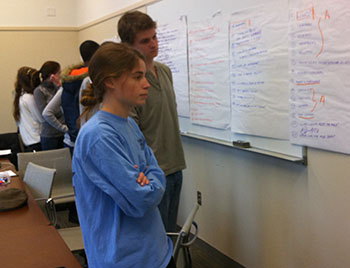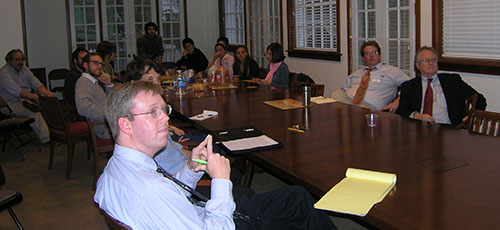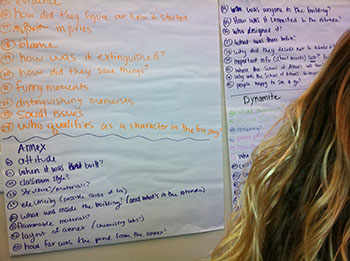VisualEyes in the Classroom
VisualEyes has been used in an innovative, team-taught seminar that invites students working with faculty across departments and disciplines to develop highly interactive visualizations while advancing a broadly collaborative research agenda. It combines the best of liberal arts and discipline-specific education with training in visual thinking and the application of new technologies. As important, it offers undergraduates an opportunity to present original research for peer review and online publication, adding value and purpose to their work.
Each seminar is designed and taught by content instructor, whose scholarly interests frame the course and help to define the research agenda, and a visualization instructor, who sets the visualization portion of the curriculum and helps realize the project's goals in a digital form. In the first third of the semester, students are introduced to the core subject matter through readings, lectures, and videos. Guest lecturers and project participants from outside the University are invited to interact with students via telecommunication technology, such as Skype.
In the second third of the course, students are encouraged to define/refine their research questions and identify/locate primary source materials that can be used to answer them. In the final third of the course, students work closely with the instructors and their peers to organize their data and create visualizations that can reveal new insights and support arguments.
At the end of the course, students make final presentations of their work to project partners and invited guests – a dynamic, interactive version of a "poster session" at an academic conference:
Over the course of the semester, students gain mastery of the course content, an understanding of basic academic research methodologies, and proficiency with visualization technologies. The seminar's collaborative research environment encourages faculty mentoring and hands-on learning. For prospective graduate students, it offers a glimpse of new educational models that are transforming our disciplines and the world of academic scholarship.
The model sketched above is based on three years of classroom experience. Scot French, an associate professor in the history department, and visualization researcher Bill Ferster have been successfully piloting this idea in a series of seminars for fourth-year history majors. The collaboration has been rich and rewarding for all involved – faculty, students, and project partners outside the academy.
An NEH-funded Jefferson's Travels seminar focused on a trip that Thomas Jefferson took to England in 1786, using Jefferson's voluminous correspondence and daily memorandum book as key primary source documents. Students worked closely with librarians and research staff at the Thomas Jefferson Foundation at Monticello to frame their research questions and identify supplemental sources.
The syllabus included lectures and readings by content specialists; discussions of the growing field of visualization, design, and technology; one-on-one visualization consultations; and final presentations to the project partners. The resulting student visualizations covered wide a range of topics can be seen on the VisualEyes website: www.viseyes.org.
Subsequent classes focused on Vinegar Hill, an AfricanAmerican community in Charlottesville razed in the 1960s for urban renewal, Jefferson's Travels to his retirement home, Poplar Forest, and a visualization of the 1828 UVa library.
We see these classes as a great model of project-based learning and rewarding to all involved. Students have an opportunity to work closely with senior faculty members across disciplines to do authentic research using next generation tools to make real contributions to the literature. Faculty members are able to advance their research agendas in innovative ways, and the collaboration with scholarly partners enhances the university's relationship in the community.

We are also exploring the use of this as the basis of problem based learning activities for K-12 classrooms with the Buck Institute of Education, through summer professional development sessions for teachers.
Links to class visualizations

